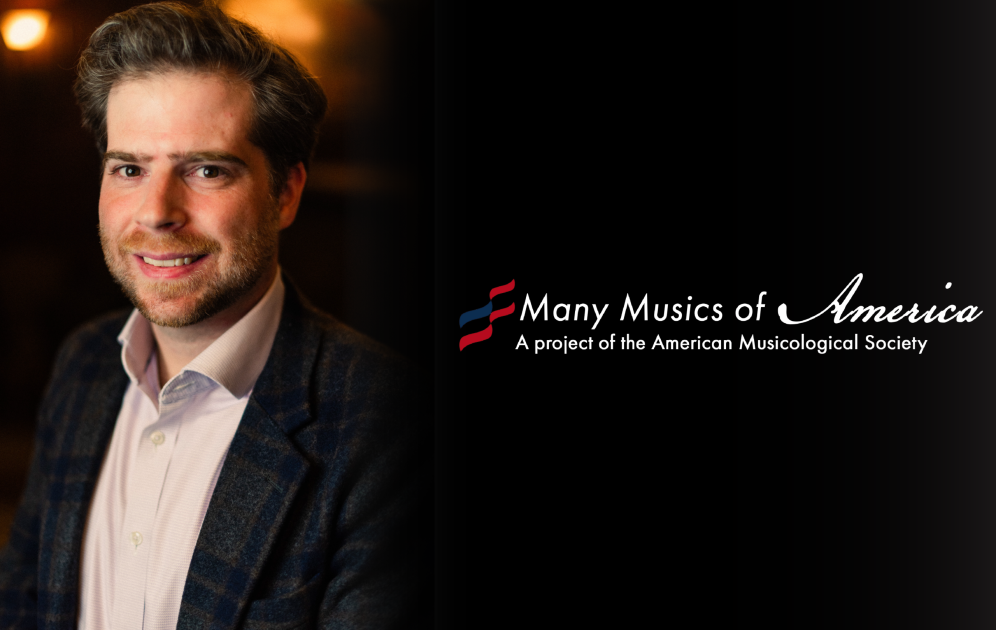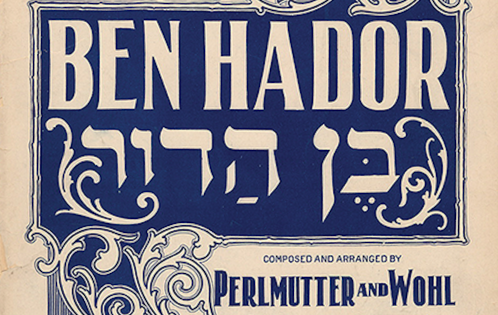In this interview, AMS External Relations Officer Matt Brounley speaks with AMS Managing Editor Jordan Musser about Many Musics of America, a public musicology project that spotlights the richness and variety of musical traditions throughout the United States. For more information, visit the Many Musics of America website at musicsofamerica.org.
Hi, Matt! Thanks for joining us at the Career Center to discuss Many Musics of America, one of many new AMS initiatives. To start, can you give us a brief overview of Many Musics of America and what makes it special?
Thanks for having me, Jordan, it’s great to be here! Many Musics of America is an event series that showcases some of the most exciting scholars and performers across the country. Each event shines a spotlight on a different American musical style, and we do our best to produce the events in locations that really matter to the tradition we’re featuring. Our goal is to create spaces where audiences can not only learn about American music, but come together to celebrate the rich histories we share. Most of the events are free or at a low cost to attend, and we also record each one so folks can enjoy them online anytime.
Let me give you an example. We had a fantastic event in April 2024 called “From Veracruz to Virginia” at the Floyd Country Store, a venue in southwest Virginia. The event featured the music of Mexilachian communities, meaning folks who trace their roots to both Mexico and Appalachia. Dr. Sophía Enriquez, an AMS member and professor at Duke University, gave a fascinating presentation about how traditional Mexican and Appalachian musics combine to form unique and new musical practices. Then, we hosted a dynamite performance by the band the Lua Project led by Estela Diaz Knott, who are also experts on Mexilachian music. Check out the video below, which offers a great example of how the Many Musics series unites scholarship, performance, and storytelling to share and celebrate American music.
The breadth of focus in the Many Musics project seems to be right there in its name: many musics. Can you say more about what musics, artists, and communities the project engages? How does that variety speak to the idea of America or American identity?
I think you’re absolutely right. It’s right there in the name, and that was very much our intention. A key part of the Many Musics of America project is appreciating that there is no single American identity. At the same time, we recognize that music often gives people a sense of American identity, whatever that might mean to them personally. With these events, we want to showcase the uncountable ways different Americans engage with music from all across the country. That’s why we’ve put together such a wide array of topics: gospel music in Pittsburgh, Seminole legends and songs, hip hop in Ohio, sea shanties in Massachusetts, and music that travels across film and TV, modern software, and even libraries and archives. From hyperlocal musical traditions to sounds that crisscross the radio waves and digital spaces, our goal is to shine a light on the rich variety of musical life that exists across the United States.
So much of musicology targets the scholarly community: individuals based at universities and other sites of higher education. But it’s clear that Many Musics of America speaks to a much wider audience of music fans interested in learning more about music and its contexts. Can you say more about the project’s focus on the wider public and nonacademic audiences?
This is one of the reasons I joined the AMS staff to work on this project. I’m a musicologist, too, and the majority of my written scholarship is, like you mentioned, targeted toward an academic audience. I care deeply about this kind of work, but I’ve also always wanted to find opportunities to share it beyond academic circles. I know many brilliant musicologists who feel the same way, but who also find that it can be hard to find the right forums in which to reach a broader audience. Many Musics provides a platform for musicologists to share the amazing things they’re working on with folks who are curious about new music and ideas, but who may be put off by the opaque style of academic books or journals. It’s my hope that the events and activities of Many Musics reach lifelong learners and music lovers across the country, and even the world.
One of the most exciting parts of the Many Musics project is the breadth not only of its musical focus but of how it reconsiders the very structures and media we use to spread knowledge. For example, one part of Many Musics is Music Means, an online publication of short “story articles” that tell narrative-based stories about music in contrast with academic argument. In what other ways is Many Musics of America rethinking how we share history and experience?
I think your example of the Music Means story articles is a great one. As musicologists, we’re often trained to write in a formal academic style that can be a bit tough for people outside of the field to connect with. While I think this style of writing is valuable for a publication like JAMS, it doesn’t really work for a publication like Music Means that’s meant to reach a wider public. That’s why we work with Music Means authors to focus on telling stories, much in the way that the best journalism does. One recent example is this fascinating Music Means piece on the 1980s “aerobics craze” by musicologist Destiny Meadows.
We organize Many Musics of America events in the same spirit. In a typical academic lecture, you’ll see an expert give a great talk about their research, perhaps with some slides of musical examples. But at Many Musics events, we encourage presenters to break up their points by weaving in live performance and to frame their research through compelling stores rather than formal exposition. A standout example of this is the fall 2025 event we put on with Damon Locks, an artist-scholar based in Chicago. Locks gave a powerful presentation about his creative work and process, including details from his archival research on Sun Ra and other Afrofuturist composers. But it wasn’t just a lecture. Locks DJed, sang, and performed with his group Black Monument Ensemble. It was really spectacular.
Many Musics has suffered funding cuts as a result of the federal government’s rescission of support for the National Endowment for the Humanities. How have you and the AMS navigated this sudden change?
We were all very disappointed that the NEH chose to terminate our grant. It left us with quite a big financial hole. But as I’ve mentioned a few times today, programs like the Many Musics of America are incredibly important to our mission. They bring outstanding musicological work to a wide and diverse audience, and that’s something we remain deeply committed to. I’ve been amazed by the outpouring of support we’ve received from both AMS members and the broader community, all of whom recognize the value of this work and have helped us keep these programs going. We’re committed to continuing the series and already have several plans for events later this year. I’m especially looking forward to an event we’re planning for this November in Minneapolis, focused on jazz piano styles and featuring Dr. Kwami Coleman.
Last but not least, what most excites you about Many Musics of America and its future?
We have some really exciting developments on the horizon. For one, we’re creating new interactive online formats for Music Means that will help future contributors bring their stories and the music behind them to life. Soon you’ll see interactive playlists, lesson plans for teachers, and other cool immersive activities. We’re also building new partnerships with other arts organizations around the country to enhance and expand our events. All in all, we think the next season of Many Musics will be our most compelling yet.

Matt Brounley is a musicologist based in New York City. He has been a member of the AMS since 2013 and joined the AMS staff in 2023. At the AMS, he is responsible for public projects, partnerships, and external affairs. As a researcher, he is interested in popular music, sound studies, and the ways musical instruments are valued. He is a graduate of Stony Brook University, and serves as an adjunct professor of music at Rutgers University and at Long Island University Brooklyn.

Jordan Musser is Managing Editor of publications at the American Musicological Society. He provides centralized editorial support, management, and volunteer coordination for all of the Society’s print and digital publication volumes, periodicals, and projects. Jordan has published his research in the Journal of the Royal Musical Association, the Journal of the American Musicological Society, Twentieth-Century Music, and other forums.





